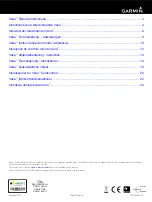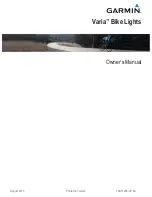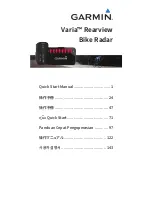
63
F.
AFTER-SALES
I.
Wear and tear
The different heavy wear items are standard items. Always replace worn parts and/or parts with
identical components for sales in the trade or with your dealer.
II.
Solving basic issues
Do not attempt to access or repair an electrical component yourself. Contact the specialist closest to
you for an appointment with a qualified person.
The information below is for explanatory purposes and is not intended to assist the user in repairs. Any
such resolution procedure must be performed by a qualified professional, aware of safety issues and
familiar with electrical maintenance.
Description of the issue
Possible causes
Resolution
After switching the battery on, the
engine doesn't assist the pedalling.
1) the engine cable (waterproof
connection seal) is loose
2) the brake lever is not properly
returned to normal position, which
forces the switch off
3) the fuse of the battery is blown
4) The speed sensor is too far from the
magnetic disk on the B.B. axis
5) the connection between the sensor
and the controller is not established or
has a faulty contact.
Firstly, check that the battery is
charged. If not, charge it.
1) Check that the connection is well
established, without any give
2) replace the brake lever in its normal
position carefully without braking
3) open the top of the battery pack and
check the condition of the fuse. If it is
blown, contact your retailer or
licensed
professional
for
a
replacement
4) adjust the distance between the
sensor and the magnetic tape so that
it is not larger than 3 mm
5) Make sure the controller and sensor
are connected properly.
Battery autonomy is shorter
(note: battery performance is directly
influenced by user weight, baggage,
wind force, type of road, constant
braking).
1) insufficient charge time
2) the ambient temperature is too low
and influences the functioning of the
battery
3) Frequent coasting or headwinds as
well as poor roads
4) the tire pressure is not high enough
(inflate them)
5) frequent stops and restarts
6) The battery has been stored without
recharging for a long time.
1) Please charge the battery following
the instructions (chapter 7.3)
2) In winter or at temperatures below
0°C, your battery must be kept indoors
3) this is a normal cause and the
problem will be solved with improved
conditions
4) inflate the tires to a pressure of 3.1
bar
5) the problem will be solved with the
improvement of the usage conditions
6) regularly recharge the battery in
accordance with the instruction
manual. If this does not solve the
problem, contact your dealer or a
qualified professional.
After connecting the charger, the
charging LEDs do not light up.
1) problem with the electrical outlet
2) faulty contact between the charger
input socket and the electrical outlet
3) the temperature is too low
1) check and repair the electrical
outlet
2) check and fully insert the socket
3) charge indoors
Содержание EVERYWAY E-300
Страница 1: ...Notice d utilisation v lo assistance lectrique WAYSCRAL EVERYWAY E 300 Code 71604 71596 71597 71595...
Страница 33: ...33 G Notes...
Страница 65: ...65 G Notes...
Страница 98: ...98 G Bemerkungen...
Страница 130: ...130 G Notas...
Страница 162: ...162 G Note...
Страница 194: ...194 G Opmerkingen...
Страница 226: ...226 G Uwagi...
Страница 258: ...258 G Notas...
Страница 290: ...290 G Note...















































